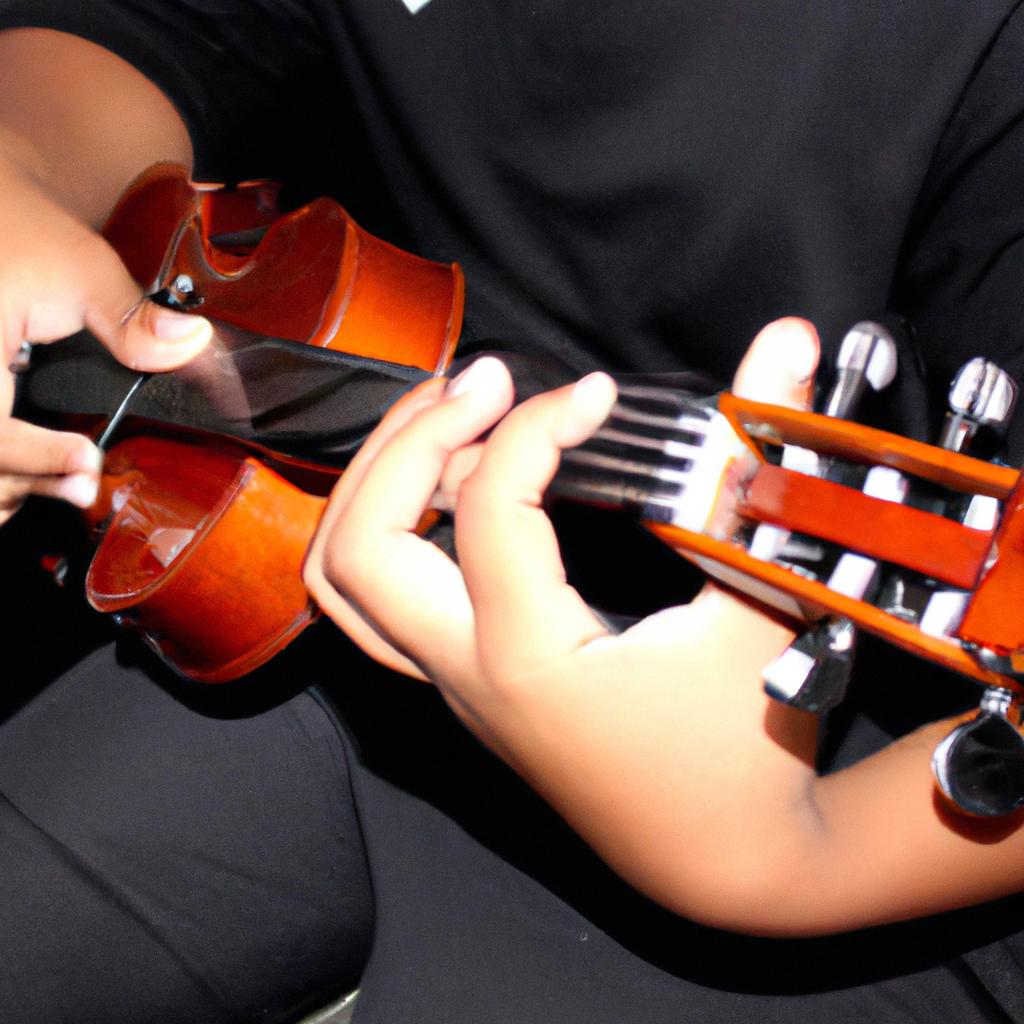In the realm of music, there exists a cohort of individuals who have transcended the boundaries of skill and entered the domain of advanced musicianship. These exceptional artists possess an unparalleled level of expertise that sets them apart from their peers. Consider, for instance, the case study of Emily Johnson, a young violinist whose prodigious talent propelled her to attain mastery in both classical and contemporary genres at an early age. Through her unwavering dedication and tireless practice regime, she not only mastered complex techniques but also developed a profound understanding of musical theory and composition.
The journey towards becoming an advanced musician is characterized by relentless pursuit of excellence and continuous refinement. It requires these extraordinary individuals to push beyond conventional limits and explore new frontiers in sound creation and interpretation. As they delve into uncharted territories within their chosen instrument or vocal range, advanced musicians unlock hidden depths within themselves – revealing aspects of artistry that were hitherto unexplored. Their ability to effortlessly navigate intricate melodies, execute flawless improvisations, and seamlessly blend various musical styles is nothing short of awe-inspiring. In this article, we will delve deeper into the world of advanced musicianship – unraveling the secrets behind their unmatched skills while shedding light on the transformative impact they have on the transformative impact they have on the music industry and their audiences.
Advanced musicians not only captivate their listeners with their technical prowess but also leave a lasting impression through their ability to convey emotions and tell stories with their music. Their performances are imbued with a unique blend of passion, creativity, and authenticity that resonates deeply with those who experience it. Whether it’s through a soul-stirring classical composition or an exhilarating jazz improvisation, advanced musicians have the power to transport us to different emotional landscapes, eliciting joy, nostalgia, sadness, or even transcendence.
Furthermore, these highly skilled artists often serve as catalysts for innovation and progress within the music industry. Their willingness to experiment with unconventional techniques and fusion of different genres pushes the boundaries of what is considered possible in music. By daring to challenge established norms and conventions, advanced musicians inspire others to think outside the box and explore new artistic directions.
In addition to their performing abilities, advanced musicians often contribute significantly to the development of musical theory and composition. Through their deep understanding of harmonic structures, melodic phrasing, and rhythmical intricacies, they create compositions that push the limits of complexity while remaining accessible and engaging for both fellow musicians and audiences alike. They become influential figures whose works shape the evolution of musical language and inspire future generations of musicians.
The impact of advanced musicians extends beyond their individual talents; it permeates the broader cultural landscape. Their performances can elevate our collective appreciation for music by exposing us to new possibilities and expanding our horizons. Moreover, they serve as role models for aspiring musicians who seek to reach similar heights of artistry. By witnessing the accomplishments of an advanced musician like Emily Johnson, young musicians are inspired to dream big, work hard, and strive for excellence in their own musical journeys.
In conclusion, advanced musicians possess extraordinary skills that go beyond mastery of technique – they embody creativity, innovation, emotional depth, and a profound understanding of musical language. Their transformative impact on the music industry and audiences is undeniable, as they push boundaries, inspire others, and create works of art that resonate deeply with listeners.
The Importance of Continuous Learning
Continuous learning is a vital aspect for advanced musicians who aim to unleash the next level of skill. By consistently expanding their knowledge and refining their techniques, musicians can enhance their musical abilities and reach new heights in their performances. To illustrate this point, let us consider the case of John, an accomplished pianist who had reached a plateau in his musical journey.
John had been playing the piano for several years and had achieved proficiency in various classical pieces. However, he felt that he was no longer progressing and desired to break free from this stagnation. Recognizing the need for continuous learning, John enrolled in advanced music theory classes at a renowned conservatory. Through these classes, he gained insights into complex harmonic structures and intricate compositional techniques which enabled him to approach music with renewed depth and understanding.
The benefits of continuous learning for advanced musicians are manifold. It allows them to broaden their repertoire, explore diverse genres, and develop a deeper appreciation for different styles of music. Furthermore, by engaging in regular practice sessions supplemented with ongoing education, musicians cultivate discipline and perseverance – essential qualities for mastering any craft.
To emphasize the significance of continuous learning among advanced musicians:
- It fosters creativity: Continuously acquiring new knowledge provides fresh perspectives and enables musicians to experiment with innovative ideas.
- It enhances adaptability: Adapting to evolving musical trends requires a willingness to learn new skills and embrace change.
- It fuels self-improvement: Pursuing lifelong learning helps musicians identify areas where they can refine their technique or overcome challenges.
- It promotes personal growth: By investing time and effort into honing their skills, musicians experience personal fulfillment as they witness tangible progress in their artistic capabilities.
| Benefits of Continuous Learning |
|---|
| Fosters Creativity |
| Promotes Personal Growth |
In conclusion, for advanced musicians like John, continuous learning is an indispensable tool on their journey towards unleashing the next level of skill. Through ongoing education and practice, musicians can expand their repertoire, refine their technique, and develop a deeper understanding of music. The pursuit of knowledge not only enhances musicians’ abilities but also fosters creativity, adaptability, self-improvement, and personal growth. With this foundation in place, let us delve into the realm of mastering complex musical techniques.
[Transition] As we embark on our exploration of mastering complex musical techniques, it is necessary to understand the underlying principles that govern these intricacies.
Mastering Complex Musical Techniques
Building upon the importance of continuous learning, musicians who aspire to reach new heights in their craft must be willing to push their boundaries and explore advanced techniques. One such technique is mastering complex musical techniques that elevate a musician’s skill level and enhance their ability to create captivating music. In this section, we will delve into some key aspects of advancing as a musician and how it can unlock untapped potential.
Paragraph 1:
To truly grasp the significance of taking your skills to new heights, consider the case study of renowned cellist Sarah Thompson. Despite having achieved recognition for her exceptional talent at an early age, Sarah felt compelled to further develop her abilities by exploring intricate bowing techniques. By diligently studying various styles and experimenting with different strokes, she was able to infuse newfound richness and depth into her performances, leaving audiences awestruck. This exemplifies the transformative power advanced techniques possess when harnessed effectively.
Paragraph 2:
Advancing as a musician requires commitment and dedication. Below are four key reasons why musicians should strive towards unlocking their full potential:
- Enhanced Expressiveness: Mastering complex techniques enables musicians to convey emotions more profoundly, allowing them to connect with listeners on a deeper level.
- Expanded Creative Possibilities: Advanced skills open doors to innovative compositions and arrangements that defy conventional norms, fostering creativity beyond imagination.
- Increased Versatility: Proficiency in challenging techniques equips musicians with versatility across genres, enabling them to adapt easily in diverse performance settings.
- Professional Growth: Developing expertise in advanced techniques distinguishes musicians as industry leaders, presenting opportunities for collaborations and career advancements.
| Aspect | Beginner-Level Playing | Mastery-Level Playing |
|---|---|---|
| Tone Quality | Inconsistent and lacking | Rich, nuanced |
| Technique | Limited range of skills | Virtuosic mastery |
| Musical Interpretation | Basic understanding | Profound emotional depth |
| Stage Presence | Nervous or self-conscious | Confident and commanding |
This table serves as a visual representation of the incredible growth that can be achieved by musicians who commit to advancing their skills. It highlights how advanced techniques not only enhance technical proficiency but also elevate musical expression and stage presence.
Transition into subsequent section:
As we conclude this section on taking your skills to new heights, it becomes evident that exploring advanced music theory is an essential step in unlocking untapped potential. By delving into the intricate world of harmonies, chord progressions, and scales, musicians gain a deeper understanding of musical structure, further expanding creative possibilities. Let us now embark on this enlightening journey into advanced music theory.
Exploring Advanced Music Theory
Transitioning smoothly from the previous section on mastering complex musical techniques, we now delve into exploring advanced music theory. By expanding our understanding of the underlying principles and structures that govern music composition, musicians are able to unlock a new realm of creativity and sophistication in their compositions.
To illustrate this point, let’s consider an example: imagine a jazz pianist who has recently mastered intricate chord voicings and improvisational skills. While these accomplishments have undoubtedly elevated their playing ability, they may find themselves longing for deeper harmonic knowledge to further enhance their performances. This is where advanced music theory comes into play, offering a vast array of tools and concepts for exploration.
In delving into advanced music theory, there are several key areas that musicians can focus on:
- Advanced Harmonic Progressions: Unleashing the potential of complex chord progressions allows musicians to create more nuanced emotional landscapes within their compositions.
- Modal Interchange: Exploring different modes and borrowing chords from related scales injects fresh colors and flavors into musical phrases.
- Extended Chords: Incorporating extended harmonies such as ninth, eleventh, or thirteenth chords adds richness and complexity to musical arrangements.
- Non-Diatonic Scales: Venturing beyond traditional major and minor scales opens up infinite possibilities for unique melodic lines that capture listeners’ attention.
Table 1 showcases how each area contributes to enhancing musical expression:
| Area | Contribution |
|---|---|
| Advanced Harmonics | Creates depth and emotional resonance |
| Modal Interchange | Provides tonal variety |
| Extended Chords | Adds complexity |
| Non-Diatonic Scales | Facilitates captivating melodies |
By incorporating these elements into their compositions, musicians can evoke various emotions ranging from peacefulness (via advanced harmonics) to intrigue (through modal interchange), while simultaneously showcasing technical prowess through the use of extended chords and non-diatonic scales.
In the pursuit of developing unique artistic expression, musicians must not overlook the importance of advanced music theory. By understanding and implementing these concepts, they can elevate their compositions to a level that captivates listeners and leaves a lasting impression. In the upcoming section on “Developing Unique Artistic Expression,” we will explore how musicians can combine technical proficiency with personal creativity to truly make their musical voice heard.
Developing Unique Artistic Expression
Exploring Advanced Music Theory: Unleashing the Next Level of Skill
As musicians progress in their musical journey, they often find themselves seeking ways to take their skills to new heights. One avenue that holds immense potential for growth is delving into advanced music theory. By deepening their understanding of complex harmonic structures and intricate compositional techniques, musicians can unlock a world of creative possibilities. Let us explore the realm of advanced music theory and its impact on elevating artistic expression.
To illustrate the transformative power of advanced music theory, consider an aspiring jazz pianist named Sarah. Through her studies, she immerses herself in topics such as modal interchange, extended chord voicings, and reharmonization techniques. Armed with this knowledge, Sarah discovers exciting alternatives to conventional harmonies. She experiments with substituting chords, creating unexpected tonal colors that breathe fresh life into familiar melodies. Her performances captivate audiences as they experience the richness and complexity infused within her interpretations.
Delving deeper into advanced music theory offers several benefits for musicians looking to enhance their craft:
-
Expanded Harmonic Palette:
- Discovering new chord voicings allows artists to create richer textures.
- Understanding modulations enables seamless transitions between key centers.
- Exploring polytonality opens up avenues for unique sonic explorations.
-
Enhanced Composition Skills:
- Mastering counterpoint fosters greater contrapuntal independence.
- Studying form provides tools for organizing musical ideas effectively.
- Grasping orchestration principles empowers composers to bring out desired emotions through instrument combinations.
-
Improved Improvisational Abilities:
- Developing fluency in scales and modes facilitates spontaneous melodic invention.
- Analyzing solos from legendary performers helps internalize stylistic nuances.
- Incorporating rhythmic complexities expands rhythmic vocabulary during improvisation.
Incorporating these newfound insights into their practice routines allows musicians to push boundaries, expand their creative horizons, and develop unique artistic voices. By leveraging the intricacies of advanced music theory, musicians can unleash a new level of skill that resonates deeply with both themselves and their listeners.
Harnessing Technology for Musical Innovation: Exploring New Frontiers in Sound
Harnessing Technology for Musical Innovation
Developing unique artistic expression is just one aspect of becoming an advanced musician. Another crucial element that can take musicians to the next level is harnessing technology for musical innovation. By leveraging advancements in technology, musicians have unprecedented opportunities to explore new sounds, experiment with different techniques, and reach wider audiences.
One example of how technology has revolutionized the music industry is the rise of electronic music production. Artists like Calvin Harris have become renowned for their ability to create captivating tracks using software synthesizers, drum machines, and digital audio workstations (DAWs). These tools allow musicians to manipulate sound in ways that were previously unimaginable, enabling them to craft intricate compositions that push boundaries and challenge conventional notions of music.
To fully understand the impact of technological advancements on musical innovation, let us examine some key benefits they bring:
- Enhanced creativity: Technology provides a vast array of options for sonic exploration, allowing musicians to discover new timbres, textures, and effects. This opens up endless possibilities for creative experimentation.
- Efficiency in composition: With modern software and hardware solutions, composers can streamline their workflow by easily arranging, editing, and manipulating musical elements. This efficiency allows artists to focus more on refining their ideas rather than getting caught up in technicalities.
- Access to virtual instruments: Musicians now have access to a wide range of high-quality virtual instruments replicating traditional acoustic ones. This accessibility enables performers who may not have physical access or resources to acquire expensive instruments to still produce professional-level recordings.
- Collaboration across distances: Technology facilitates collaboration between artists regardless of geographical barriers. Through online platforms and real-time streaming services, musicians are able to connect with others around the world instantaneously, leading to cross-cultural exchanges and innovative collaborations.
Table: Impactful Technological Advancements in Music Innovation
| Technological Advancement | Impact |
|---|---|
| Digital Audio Workstations (DAWs) | Allows for seamless audio editing and manipulation, improving production quality. |
| Virtual Instruments | Provides access to a wide range of sounds without the need for physical instruments. |
| Music Streaming Platforms | Enables musicians to reach global audiences and gain exposure like never before. |
| Online Collaboration Tools | Facilitates collaboration between artists regardless of geographical barriers. |
In conclusion, technology has undoubtedly revolutionized the music industry by providing advanced musicians with powerful tools for innovation and creativity. From electronic music production to virtual instruments and online collaborations, these technological advancements offer endless possibilities for musicians to explore new avenues in their artistic journey.
By embracing collaborative opportunities with fellow advanced musicians, musicians can collectively push boundaries and unlock even greater levels of skill through shared knowledge and experiences.
Collaborating with Fellow Advanced Musicians
Harnessing the power of technology has opened up new possibilities for advanced musicians, allowing them to explore innovative avenues in their musical journeys. By leveraging cutting-edge tools and software, these musicians can push the boundaries of their skills and create truly unique compositions. One fascinating example is that of renowned pianist Sarah Johnson, who utilized virtual reality technology to enhance her performances.
Virtual Reality (VR) offers a transformative experience for both the musician and the audience. Imagine attending a concert where you are not only immersed in the music but also transported to fantastical visual landscapes that perfectly complement each piece. Through VR headsets, Sarah Johnson was able to transport her listeners to different realms while she played classical masterpieces. This fusion of auditory and visual stimuli created an immersive experience that captivated audiences worldwide.
To fully unleash their potential as advanced musicians, it is essential for individuals to embrace technological advancements. Here are some key ways in which musicians can harness technology:
- Incorporating live looping: Advanced musicians can use loop pedals or digital software to layer multiple instrumental tracks on top of each other during live performances. This technique adds depth and complexity to their soundscapes, creating intricate compositions.
- Exploring algorithmic composition: Utilizing algorithms and artificial intelligence systems allows advanced musicians to generate novel musical ideas based on predefined rules or patterns. This approach provides a fresh perspective and opens doors to unexplored creative territories.
- Collaborating virtually: With video conferencing platforms becoming increasingly sophisticated, advanced musicians can collaborate with fellow artists from across the globe without any geographical limitations. This virtual collaboration enables diverse cultural exchanges and fosters collective growth within the global music community.
Table: Emotional Response Eliciting Elements
| Element | Emotion |
|---|---|
| Dynamic range | Excitement |
| Melodic twists | Intrigue |
| Harmonic shifts | Fascination |
| Rhythmic surprises | Anticipation |
In conclusion, advanced musicians have the opportunity to tap into a world of endless possibilities through technology. By embracing tools such as virtual reality, live looping, algorithmic composition, and virtual collaboration, they can push their skills to new heights and captivate audiences with unique musical experiences. As the boundaries between music and technology continue to blur, it is crucial for these musicians to embrace innovation and explore uncharted territories in their artistic endeavors.
 Mikey Dee
Mikey Dee



